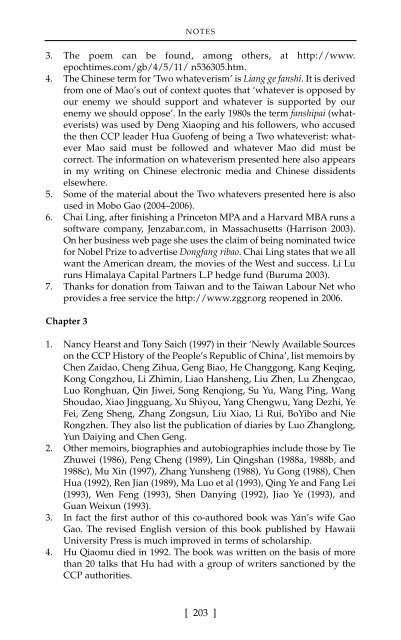Battle for China's Past : Mao and the Cultural Revolution
Battle for China's Past : Mao and the Cultural Revolution
Battle for China's Past : Mao and the Cultural Revolution
You also want an ePaper? Increase the reach of your titles
YUMPU automatically turns print PDFs into web optimized ePapers that Google loves.
3. The poem can be found, among o<strong>the</strong>rs, at http://www.<br />
epochtimes.com/gb/4/5/11/ n536305.htm.<br />
4. The Chinese term <strong>for</strong> ‘Two whateverism’ is Liang ge fanshi. It is derived<br />
from one of <strong>Mao</strong>’s out of context quotes that ‘whatever is opposed by<br />
our enemy we should support <strong>and</strong> whatever is supported by our<br />
enemy we should oppose’. In <strong>the</strong> early 1980s <strong>the</strong> term fanshipai (whateverists)<br />
was used by Deng Xiaoping <strong>and</strong> his followers, who accused<br />
<strong>the</strong> <strong>the</strong>n CCP leader Hua Guofeng of being a Two whateverist: whatever<br />
<strong>Mao</strong> said must be followed <strong>and</strong> whatever <strong>Mao</strong> did must be<br />
correct. The in<strong>for</strong>mation on whateverism presented here also appears<br />
in my writing on Chinese electronic media <strong>and</strong> Chinese dissidents<br />
elsewhere.<br />
5. Some of <strong>the</strong> material about <strong>the</strong> Two whatevers presented here is also<br />
used in Mobo Gao (2004–2006).<br />
6. Chai Ling, after finishing a Princeton MPA <strong>and</strong> a Harvard MBA runs a<br />
software company, Jenzabar.com, in Massachusetts (Harrison 2003).<br />
On her business web page she uses <strong>the</strong> claim of being nominated twice<br />
<strong>for</strong> Nobel Prize to advertise Dongfang ribao. Chai Ling states that we all<br />
want <strong>the</strong> American dream, <strong>the</strong> movies of <strong>the</strong> West <strong>and</strong> success. Li Lu<br />
runs Himalaya Capital Partners L.P hedge fund (Buruma 2003).<br />
7. Thanks <strong>for</strong> donation from Taiwan <strong>and</strong> to <strong>the</strong> Taiwan Labour Net who<br />
provides a free service <strong>the</strong> http://www.zggr.org reopened in 2006.<br />
Chapter 3<br />
NOTES<br />
1. Nancy Hearst <strong>and</strong> Tony Saich (1997) in <strong>the</strong>ir ‘Newly Available Sources<br />
on <strong>the</strong> CCP History of <strong>the</strong> People’s Republic of China’, list memoirs by<br />
Chen Zaidao, Cheng Zihua, Geng Biao, He Changgong, Kang Keqing,<br />
Kong Congzhou, Li Zhimin, Liao Hansheng, Liu Zhen, Lu Zhengcao,<br />
Luo Ronghuan, Qin Jiwei, Song Renqiong, Su Yu, Wang Ping, Wang<br />
Shoudao, Xiao Jingguang, Xu Shiyou, Yang Chengwu, Yang Dezhi, Ye<br />
Fei, Zeng Sheng, Zhang Zongsun, Liu Xiao, Li Rui, BoYibo <strong>and</strong> Nie<br />
Rongzhen. They also list <strong>the</strong> publication of diaries by Luo Zhanglong,<br />
Yun Daiying <strong>and</strong> Chen Geng.<br />
2. O<strong>the</strong>r memoirs, biographies <strong>and</strong> autobiographies include those by Tie<br />
Zhuwei (1986), Peng Cheng (1989), Lin Qingshan (1988a, 1988b, <strong>and</strong><br />
1988c), Mu Xin (1997), Zhang Yunsheng (1988), Yu Gong (1988), Chen<br />
Hua (1992), Ren Jian (1989), Ma Luo et al (1993), Qing Ye <strong>and</strong> Fang Lei<br />
(1993), Wen Feng (1993), Shen Danying (1992), Jiao Ye (1993), <strong>and</strong><br />
Guan Weixun (1993).<br />
3. In fact <strong>the</strong> first author of this co-authored book was Yan’s wife Gao<br />
Gao. The revised English version of this book published by Hawaii<br />
University Press is much improved in terms of scholarship.<br />
4. Hu Qiaomu died in 1992. The book was written on <strong>the</strong> basis of more<br />
than 20 talks that Hu had with a group of writers sanctioned by <strong>the</strong><br />
CCP authorities.<br />
[ 203 ]
















